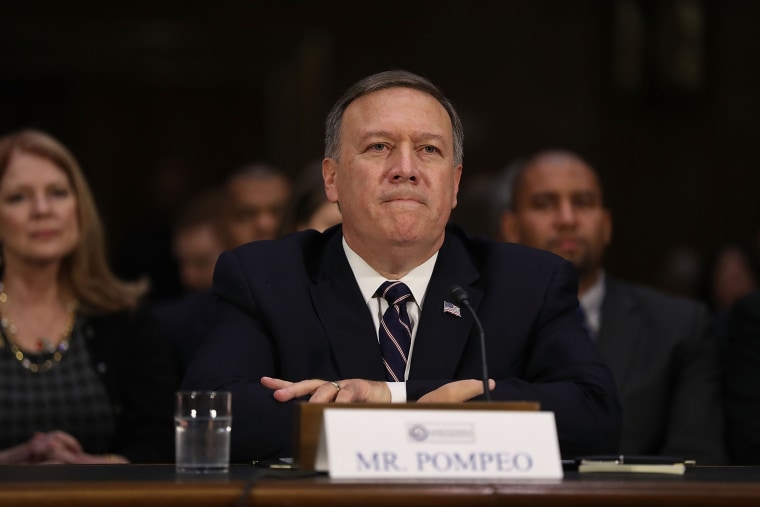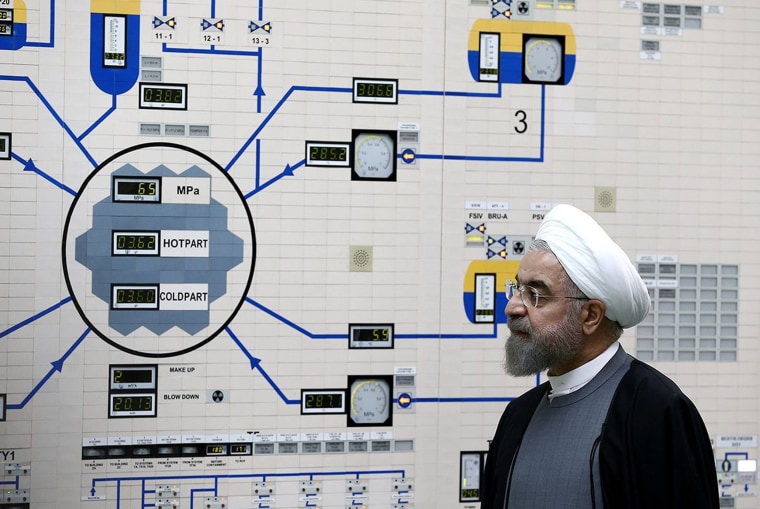When President Donald Trump explained why he dumped Rex Tillerson as secretary of state and chose CIA Director Mike Pompeo to replace him, disagreements over the Iran nuclear deal were at the top of his list.
"I actually got along well with Rex, but really it was a different mindset, a different thinking," Trump said Tuesday as he departed the White House for a trip to California. "When you look at the Iran deal, I think it's terrible. I guess he thought it was OK. ... So we were not really thinking the same. With Mike, Mike Pompeo, we have a very similar thought process. I think it's going to go very well."
"A similar thought process" apparently means a shared penchant for blunt commentary, and a common belief that the Iran deal is questionable, according to a review of Pompeo's speeches, testimony and public comments.
In Aspen last July, Pompeo even referenced real estate to describe Iran's compliance with the nuclear deal, a comparison bound to resonate with his boss.

"They don't pay the rent, you call them, and then they send a check and it doesn't clear," Pompeo said. "And then the next day, there's this tired old sofa in the front yard."
While Tillerson may have been aware of the niceties of dealing with the other signatories to the 2014 deal, Pompeo has used his position at the CIA to lay out what he, and presumably the president, believes about Iran in the context of the region and the threat it poses. He has consistently portrayed Iran as the focus of evil in the Middle East and a worldwide threat.
"As secretary of state, Pompeo is likely to be more in line with the president's position than was Tillerson," said former acting CIA Director John McLaughlin. "For example, the idea that the other signatories should work to toughen the [nuclear] deal in order to keep us in. That will be a hard thing to achieve and failure to achieve it could jeopardize the nuclear deal — unless Trump changes his mind (which of course would come as no great surprise)."
Michael McFaul, a former U.S. ambassador to Russia, said Tillerson had often worked with Defense Secretary James Mattis to check Trump's "more impulsive" foreign policy ideas, but the balance of power has shifted with his replacement by Pompeo.
"The first big test will be Iran," McFaul said. "Tillerson and Mattis supported the Iran nuclear deal. Trump and Pompeo have stated many times that they do not."
Pompeo's most venomous comments about Iran came at the Texas National Security Forum in Austin in October, where he called it "a thuggish police state" and compared its ambitions to those of ISIS.
"Iran's Ministry of Intelligence and Security and the Islamic Revolutionary Guard Corps (IRGC) are the cudgels of a despotic theocracy," Pompeo said. "They're the vanguard of a pernicious empire that is expanding its power and influence across the Middle East."
A week later, he told the Foundation for Defense of Democracies (FDD) that Trump is of the same mind.
"The president has come to view the threat from Iran as at the center of so much of the turmoil that bogs us down in lots of places in the Middle East, right? Whether it's Lebanese Hezbollah, the threat that it presents to both Lebanon and to Israel; whether it's the Shia militias—you can see the impact that they're having today. …
"The list of Iranian transgressions is long. And from an intelligence perspective, we shared that with the president. I think he concluded that we needed to reconfigure our relationships, not only with Iran but with the Gulf states and with Israel, to ensure that we are addressing what he views as the real threat to the United States in a comprehensive way."
In more than one public comment, Pompeo has suggested, without providing details, that the president has permitted the agency to push out more covert actions, ones "the previous administration chose not to."
As for the nuclear deal, he dismisses the specifics of detection and verification and focuses instead on Iran's general attitude toward the U.S. Although he has not called for the U.S. to tear up the deal — that's a policy issue and as intelligence chief, Pompeo consistently steered clear of that — but he leaves no doubt of his belief that the Iranians got the better of the arrangement.
"[W]e need even more intrusive inspection," he told the FDD. "The deal put us in a marginally better place with respect to inspection, but the Iranians have on multiple occasions been capable of presenting a continued threat through covert efforts to develop their nuclear program along multiple dimensions, right? The missile dimension, the weaponization effort, the nuclear component itself."

Pompeo also described a potential diplomatic effort that would fit into his new responsibilities as secretary of state. No longer, he suggests, should the U.S. deal only with the other signatories of the Iran deal, officially the Joint Comprehensive Plan of Action (JCPOA), but should expand discussions to include Iran's neighbors.
"We need all of our partners. Sometimes I hear folks talk about the JCPOA and our partners, and nary a mention of the Saudis, the Emirates, the Israelis, but lots of talk about Germans and Brits and French, and that's great. They're important partners, too. We need them all working against the continued expansion of the Iranians."
The goal, he said, was a rollback of Iran's influence, an end, as he told his Texas audience in October, to the "death and destruction" inflicted across the Middle East by Iran's Revolutionary Guard, the IRGC, and its special forces unit, the Quds Force.
Norman Roule, the former national intelligence manager for Iran at the Office of the Director of National Intelligence, says that Pompeo’s rhetoric is unlikely to having any real problematic effect, given the current state of diplomatic relations with Iran, and that Pompeo should not be seen as an extremist.
“Pompeo has a level-headed view of the Iran problem," Roule said. "He just wants a more demanding approach."
In the speech to the FDD, Pompeo said that Trump wants him to "evaluate how we might present a more comprehensive effort to push back against the Quds Force, the IRGC more broadly, and the Iranian regime itself."
In his new job, Pompeo is likely to have more power and a lot more influence to carry that out.